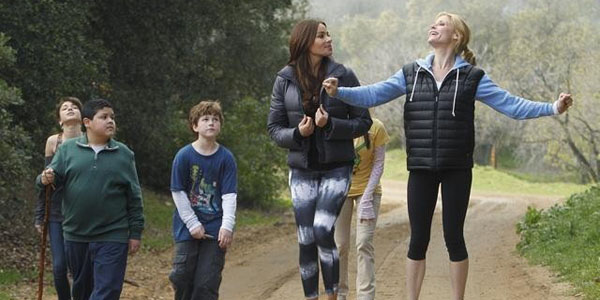
1. Some of the biggest news this week was Notre Dame quarterback Manti Te’o’s girlfriend – the one he had reportedly visited between games, who was sick and eventually died of leukemia – turning out to be a hoax. It was one of the most inspirational and heart-rending stories of the 2012 college football season and then, on Wednesday, in the span of a quick article, Deadspin debunked the myth:
Notre Dame’s Manti Te’o, the stories said, played this season under a terrible burden. A Mormon linebacker who led his Catholic school’s football program back to glory, Te’o was whipsawed between personal tragedies along the way. In the span of six hours in September, as Sports Illustrated told it, Te’o learned first of the death of his grandmother, Annette Santiago, and then of the death of his girlfriend, Lennay Kekua.
Kekua, 22 years old, had been in a serious car accident in California, and then had been diagnosed with leukemia. SI‘s Pete Thamel described how Te’o would phone her in her hospital room and stay on the line with her as he slept through the night. “Her relatives told him that at her lowest points, as she fought to emerge from a coma, her breathing rate would increase at the sound of his voice,” Thamel wrote.
…The South Bend Tribune wrote an article describing the young couple’s fairytale meeting—she, a Stanford student; he, a Notre Dame star—after a football game outside Palo Alto.
Did you enjoy the uplifiting story, the tale of a man who responded to adversity by becoming one of the top players of the game? If so, stop reading.
It’s an extraordinarily sensitive issue because Manti is, in all probability, the victim of a falsified Internet persona, becoming close with and falling in love with a person who didn’t exist. The nation is, once more, appalled by the cruelty of ‘those people out there’ and ‘how they could’ve done this.’
The story’s dark and unacknowledged component is the ‘those people out there’ could have included football hero Manti, too, on the outside possibility that he fabricated all of this himself – though now it’s pretty clear he didn’t, though it seems he didn’t stop talking about the tragedy after he found out it was a hoax. There are so many aspects of human nature at work in the public’s reaction – the blind desire to keep believing a hero is blameless and the contrasting exultation in getting the opportunity to vilify a guy who, by all accounts, is an extraordinary leader and friend. And, of course, there’s also the ever-present idea in celebrity culture that someone can be a hero or a villain, but never both simultaneously. It’s the same reason that obituaries are almost never two-dimensional ones – now that the person is a victim, he or she is all of a sudden morally blameless. In any case, the media’s ‘innocent until proven guilty’ attitude toward Manti was heartening: either way, the guy certainly needs comfort right now, and sports journalism’s compassion was encouraging. As more details emerge, it’ll likely become a quintessential story of the effects of technology and media on human relationships.
And as a final bizarre twist, Te’o was probably duped by a Christian rock singer.
2. There’s an amazing piece in the New York Times about the rules of bragging, but it cuts more deeply than that. In the last two weeks, many high-schoolers have received answers on early applications. People have never been more or less humble than they are now, but it used to not be quite so -in-your-face (or in-your-feed). The contemporary phenomena of maternal overinvestment and ease of sharing accomplishments through technology have certainly contributed, but the roots of bragging are more psychological, more innate:
Watching people parse the sharing of good news made me think about the bigger issue of bragging. As I researched it further, it became clear that this is something most of us are conflicted about: we want to let people know about our successes, but we don’t want to appear to be doing so. And we want to hear about others’ victories, but not too often or too loudly.
There is a common perception that it’s more acceptable to brag now than it was in the past, especially about our children. It used to be that parents didn’t want their children to get swollen heads (when’s the last time you heard that expression?) or, for more superstitious reasons, feared that praise would bring on the wrath of the gods, or at least bad luck.
Such trends are hard to measure. What is clear is that technology has provided “more outlets and a lot more reinforcement,” said Susan Krauss Whitbourne, a professor of psychology at the University of Massachusetts, Amherst. “Every cute thing a baby does is on YouTube.”
There are many reasons people feel the need to publicize their successes, ranging from sharing the joy to one-upping. But what research shows is that talking about ourselves just feels good.
Ha! They’ve hit the nail on the head. Simple self-absorption or the old, old desire to be fully known and yet loved? Both? The rest of the piece reads like it could be The Onion’s first neuroscience article:
“When asked questions about themselves, there was more reward activity than when asked about someone else,” Ms. Tamir said. And there was even more activity when the participants could choose to share information, by pressing a button, with someone outside the scanner. [creepy social media connection? Probably.]
Another experiment found that people were willing to give up small amounts of money to reveal information about themselves, rather than talk about someone else.
“I think there is a natural human tendency” to talk about oneself, Ms. Tamir said.
…She said people responded to self-praise negatively or, more subtly, with a long silence or a roll of the eyes.
3. On the culture front, First Things has discovered that “Arrested Development Is The Brothers Karamazov” in the most brilliant Christianity and pop culture article I’ve read in a long time. We start with the realization that “‘an epileptic chicken’ is how the accused described Smerdyakov, and go from there, ht WRB:
Every unhappy family is unhappy in its own way, unless the family consists of a morally depraved patriarch and three highly differentiated siblings who, after years out of contact with each other, convene at the family home for a slowly escalating mess made inevitable by their respective and collective dysfunctions, in which case that family is unhappy in the same way as the Karamazovs.
If the same family is subjected to a criminal prosecution after being set up by a conniving quasi-sibling, if the brothers keep trying to mooch money off the family, and if the eldest brother is brash, the middle one smart, and the youngest one saintly, then we have to consider the possibility that this family actually is the Karamazovs, even if they call themselves the Bluths and they appear in an early 2000s Fox sitcom and not a nineteenth-century Russian novel. In which case Mitch Hurwitz (who has a degree in theology from Georgetown) is Dostoevsky. That’s probably the most farfetched parallel in this comparison. The rest are uncanny.
Mitchell Hurwitz has a background in theology?! First I’d heard of it, but it goes a long way towards explaining how the show depicts human recidivism at its worst while at the same time taking a compassionate and humorous slant on it. But back to the Brothers K:
…Uncle Oscar is Father Zosima, an unworldly man of great gentleness and inner peace who is more of a father to the youngest son than the family patriarch is. Phoenix is Moscow, where Michael/Ivan keeps trying to escape to. And Fyodor Pavlovich’s taverns are his Cornballer. Some of these parallels are less critically fruitful than others [ha!].
…if AD is an updated version of TBK, then it’s worth asking what updates Hurwitz thought necessary in order to bring the story up to date, apart from the set dressing.
Dostoevsky’s intention with The Brothers Karamazov was to persuade Russians that their instinctive love of God was a great resource, and it would bring them true happiness if they would only stop enslaving themselves to reason or sensual pleasure. In the thematic map of AD, love of family replaces love of God as the thing that every keeps gesturing toward and no one quite achieves, but unlike Dostoevsky, Hurwitz doesn’t let anybody get redeemed in the end. Maybe that means he doesn’t think love is powerful enough to redeem a fallen mankind anymore, which would be a depressing assessment of our age relative to Dostoevsky’s. Or maybe it just means Hurwitz is saving the tragic but uplifting conclusion for season 4. “On the next Arrested Development: George Senior gets murdered, Michael goes insane, G.O.B. finds God, and Buster starts a revolution.” I would watch those Netflix episodes.
4. In social science, The Atlantic addresses behavioral economics, the branch of economics which focuses on how human beings are irrational, a school led by such denizens as Daniel Kahneman and Amos Tversky, psychology researchers who started getting serious notice from economists in the early eighties when they contradicted the Enlightenment view of rational man that had driven the first couple centuries of classical economics post-Adam Smith. Behavioral econ has exploded into popular journalism in the last few years and the Atlantic, a little slow on the uptake, still offers a fantastic summary of economics for the irrational man in an interview with David McFadden:
I think the final message is that neither the physiology of pleasure nor the methods we use to make choices are as simple or as single-minded as the classical economists thought. A lot of behavior is consistent with pursuit of self-interest, but in novel or ambiguous decision-making environments there is a good chance that our habits will fail us and inconsistencies in the way we process information will undo us.
Despite a somewhat sensational title for The Atlantic‘s piece, it’s worth noting that most economists abandoned rational choice theory as a description of reality a couple of decades ago – the theory of the perfectly rational man, while still useful for researchers and policy makers, is long-dead for how people view practical anthropology. But, then again, we still want to believe we’re perfectly rational and will usually err on the side of thinking we are – regardless of where academic consensus lands on the issue.
5. At Esquire, a fascinating interview with starlet Megan Fox about the psychological struggles of being a celebrity and sex symbol – accompanied, ironically and inevitably, with a provocative photoshoot. Still, the interview captures a figure somewhere between starry-eyed Hollywood novice and out-of-control, headline-making public parody – interestingly enough, a deeply Pentecostal sex symbol:
Her career spun out of control in the way it was supposed to: She played a girl in a bikini dancing under a waterfall, then moved to L. A., then played jailbait on Two and a Half Men, then the ditzy daughter on Hope & Faith, then the Belly Leaning Over a Camaro in the Transformer movies. Once the momentum began rolling, the only direction was forward.
“I felt powerless in that image,” she says. “I didn’t feel powerful. It ate every other part of my personality, not for me but for how people saw me, because there was nothing else to see or know. That devalued me. Because I wasn’t anything. I was an image. I was a picture. I was a pose.”
And then there’s the Megan Fox we didn’t know: Fox began speaking in tongues around the age of eight, when she attended a Pentecostal church in Tennessee. “The energy is so intense in the room,” she says, “that you feel like anything can happen. They’re going to hate that I compare it to this, but have you ever watched footage of a Santeria gathering or someone doing voodoo? You know how palpable the energy is? Whatever’s going on there, it’s for real.”
Others in her situation have found release in booze and pills. Fox has found hers in church…
“It feels like a lot of energy coming through the top of your head — I’m going to sound like such a lunatic — and then your whole body is filled with this electric current. And you just start speaking, but you’re not thinking because you have no idea what you’re saying. Words are coming out of your mouth, and you can’t control it. The idea is that it’s a language that only God understands. It’s the language that’s spoken in heaven. It’s called ‘getting the Holy Ghost.‘ ”
…”I can’t stand pills. I don’t like drinking. I don’t like feeling out of control,” she explains. “I have to feel like I’m in control of my body. And I know what you’re thinking, Then why would I want to go to church and speak in tongues?
“You have to understand, there I feel safe. I was raised to believe that you’re safe in God’s hands. But I don’t feel safe with myself.”
How did that line miss the cut for Transformers!? Seriously.
6. What’s in a name? The difference between actions and more identity-laden labels was brought out by behavioral economist Dan Ariely:
In a series of three experiments, participants were given a chance to claim unearned money at the expense of the researchers. There were two conditions in each experiment, and the only difference between them was in the wording of the instructions. In the first condition participants were told that researchers were interested in “how common cheating is on college campuses,” while in the second, they wondered “how common cheaters are on college campuses.”
This is a subtle but, as it turned out, significant difference. Participants in the “cheating” condition claimed significantly more cash than those in the “cheater” condition, who, similar to when we tempted people who had sworn on the bible, did not cheat at all. This was true in both face-to-face and online interactions, indicating that relative anonymity cannot displace the implications of self-identifying as a cheater. People may allow themselves to cheat sometimes, but not if it involves identifying themselves as Cheaters.
This attempt to divide our actions from our identity is characteristic in human nature, and it can be as subtle as the difference between a noun and a verb. I lied about something just last week, but surely that doesn’t make me a liar! These labels imply deficiency of character (theologically ‘original sin’) that we want to ignore – a major agent of self-justification is pretending that reprehensible actions don’t imply reprehensible character and, in this particular study, it was even worth losing money to be cheat-ing instead of a Cheat-er.
7. Finally, another great write-up from The Onion, an implausibly censored “Man Who Got [Stuff] Together 5 Years Ago Still Viewed As Lovable [Messup] By Friends, Family”. Seriously, don’t read this one if profanity is at all a concern – but it’s hilarious, and deeply true-to-life:
Benton, who has held a steady job as a marketing manager since 2008 and recently made a down payment on his first home, reportedly retains a persistent reputation as a kindhearted but hopeless individual, despite having long ago settled down and abandoned the bad habits he once struggled with.
‘We love Josh, he’s always fun to have around, but the guy still lives his life like an 18-year-old, you know?’ Benton’s cousin Ari Freier, 33, said of the man who drives a 2010 Toyota Prius to work each morning, arriving at the office by 8 a.m. ‘Most people with a wild streak like that get it out of their system when they’re young, but Josh never quite made that transition.’
‘Who knows, though, maybe someday he’ll meet the right person and make something of himself,’ added Freier, whose cousin has been involved in a healthy, long-term relationship for the past three years. ‘Stranger things have happened.’
…Benton’s parents, meanwhile, cited various personal issues that either did not exist or were drastically out of date as they confirmed that they loved their son in spite of his many flaws, and expressed confidence he could turn his life around.
‘Josh still needs to get his priorities straight, but he knows we’re always there to support him whenever he runs out of cash or needs to move back in,’ Benton’s mother, Laura, told reporters. ‘He’ll find his way eventually. Until then, I suppose we just have to accept that he’s still figuring a lot of things out with his life’…
‘Sometimes I worry about him. We all do. It’s fine for Josh to drink every now and then, but when he’s blacking out and waking up sprawled on the bathroom floor with a broken hand, it’s clearly time for him to seriously reevaluate his life,’ said Benton’s friend Zach Schneider, referring to an incident that occurred once in 2004 and was never repeated. ‘Hard not to love the guy, though. I just hope he’s able to break out of this tailspin soon.’ Reached for comment, Benton, who confirmed he had just purchased an engagement ring and was planning to propose to his girlfriend later this week, expressed gratitude for the concern of his family and friends.
‘I’m lucky to have so many people in my life who care about me,’ Benton said. ‘I just hope one day I can stop being such a [screw]up and get my [life] together like them.’
[youtube=https://www.youtube.com/watch?v=V1pOjj49d9Y&w=600]
And in the spirit of Epiphany:
[youtube=https://www.youtube.com/watch?feature=player_detailpage&v=DsnEl3hj73o&w=600]
PS: Pre-registration for Mockingbird’s Spring 2013 Conference in NYC Opens Monday!

COMMENTS
2 responses to “Another Week Ends: Manti Te’o, More Humblebragging, Russian Arrested Development, Pauline Economists, Pentecostal Megan Fox, Don’t Label Me and Shaking Caricatures”
Leave a Reply


















Wow. There’s a lot to unpack in Fox’s words.